St Andrew is honoured by all the Christian churches; moreover he is both the patron saint of Scotland and one of Russia’s patron saints – the protector in particular of the Russian navy. The first half of Russkaya Cappella’s St Aloysius concert on 30 November 2011 started with compositions in honour of St Andrew and concluded with music in memory of some 3,000 merchant marine and allied naval personnel of several nationalities who were lost from the Arctic Convoys during the Second World War (to Russians, the Great Patriotic War, Великая Отечественная Война), as they sought to deliver material support to the Soviet arm of the Allied war effort.
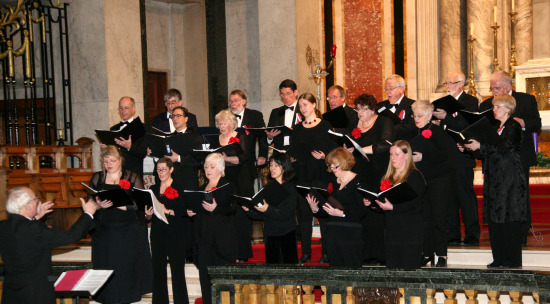
The Convoys have been extensively commemorated in Russia during 2011, the seventieth year since they began. With Soviet armed forces also providing defensive cover for part of the route, the Convoys were the closest to actual military collaboration between the USSR and the western allies during that war.
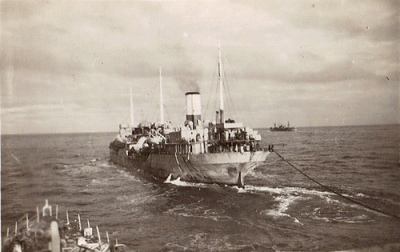
These naval-escorted convoys (a defensive strategy in response to enemy blockades, developed by Britain in the First World War to minimise shipping losses) commenced in August 1941, two months after the Nazi invasion of the Soviet Union. Their primary function was to convey military equipment and munitions provided under the American Lend-Lease programme to the Eastern Front, some of it destined, via the ‘Road of Life’, for the siege of Leningrad, in which ultimately 1.5m Russians perished. The ships returned carrying Russian strategic raw materials, including gold and platinum. This continued until May 1945, by which time there had been 42 eastbound convoys, delivering 4m tons of war supplies, including 5,000 tanks and 7,000 aircraft, with 36 convoys sailing westwards. In all 581 merchant ships (including 292 American, 184 British and 56 Russian) steamed from assembly points in Iceland and Britain (including the Clyde and particularly Loch Ewe in north-west Scotland) along routes skirting the Arctic pack ice, rounding the northern tip of Nazi-occupied Norway – its fjords a haven for U-boats and heavy naval surface vessels – to the Kola Inlet and heavily bombed Murmansk (eight days’ sail by the winter route) or to the White Sea and Arkhangelsk (fifteen days by the summer route round the west of Iceland) and then back again. The weather – at times bringing a temperature of -50 degrees – and the enemy action from above, on and below the surface, made this ‘the worst journey in the world’, according to Winston Churchill. Losses amounted to 85 merchant ships and 16 Royal Naval vessels.
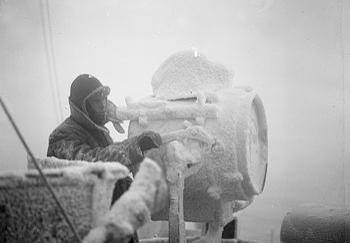
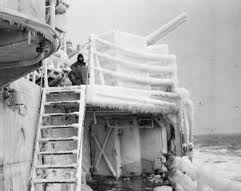
Icy conditions on naval escort vessels
More than a quarter of the merchant losses were from a single convoy, code-name PQ17, which was ordered to scatter without its naval protection, redeployed in response to the belief that the Nazi battleship Tirpitz and other naval vessels had left Norway – a belief found subsequently to have been false. 153 merchant seamen died as unprotected ships were picked off by bombers and U-boats.
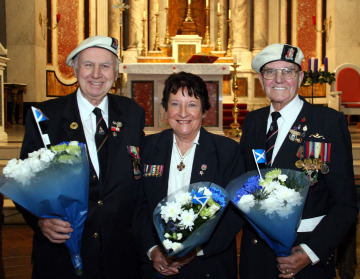 The choir and audience were therefore greatly privileged to have among them two veteran survivors of the Arctic Convoys, Jim Osler and Bill Bannerman, resplendent in the medals awarded by the Russian state and wearing their Arctic Stars, accompanied by Christine Milliken of the Russian Arctic Convoy Club in Scotland. Jim had been a radio operator on board the Royal Naval tanker Aldersdale, part of the ill-fated PQ17 convoy, when, in July 1942, it was first bombed and then torpedoed and sunk in the Barents Sea north of Norway. The crew were rescued by the minesweeper Salamander and taken to Arkhangelsk. Jim’s radio skills led to a posting to what became GCHQ at Bletchley Park, where Alan Turing was playing a key part in the breaking of the Enigma codes, thereby helping protect shipping movements. Thereafter Jim’s recruitment by MI6 led to subsequent action with the Norwegian resistance. Bill had been recruited to the Royal Navy at the outbreak of war and because of his engineering skills became a submariner, which he remained throughout, engaged in helping protect the Arctic Convoys.
The choir and audience were therefore greatly privileged to have among them two veteran survivors of the Arctic Convoys, Jim Osler and Bill Bannerman, resplendent in the medals awarded by the Russian state and wearing their Arctic Stars, accompanied by Christine Milliken of the Russian Arctic Convoy Club in Scotland. Jim had been a radio operator on board the Royal Naval tanker Aldersdale, part of the ill-fated PQ17 convoy, when, in July 1942, it was first bombed and then torpedoed and sunk in the Barents Sea north of Norway. The crew were rescued by the minesweeper Salamander and taken to Arkhangelsk. Jim’s radio skills led to a posting to what became GCHQ at Bletchley Park, where Alan Turing was playing a key part in the breaking of the Enigma codes, thereby helping protect shipping movements. Thereafter Jim’s recruitment by MI6 led to subsequent action with the Norwegian resistance. Bill had been recruited to the Royal Navy at the outbreak of war and because of his engineering skills became a submariner, which he remained throughout, engaged in helping protect the Arctic Convoys.
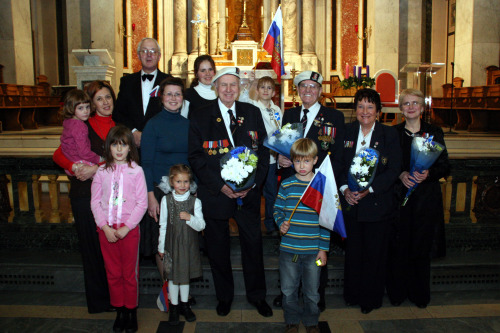
All present welcomed the opportunity to express deep appreciation of their bravery and fortitude. The choir, directed by Svetlana Zvereva, sang ‘Eternal Memory’ and other prayers. Natalia McVitie offered greetings on behalf of the Glasgow Russian School as the children presented flowers to the veterans.
Fred Hay
 Friday, March 15, 2013
Friday, March 15, 2013  James VI was crowned King of Scotland in the Church of the Holy Rude in Stirling in 1567. Some fifty years later the first Romanov was crowned in the Cathedral of the Dormition in the Moscow Kremlin; Tsar Mikhail’s descendants were to rule Russia for the next three centuries. Both events took place at times of political turmoil.
James VI was crowned King of Scotland in the Church of the Holy Rude in Stirling in 1567. Some fifty years later the first Romanov was crowned in the Cathedral of the Dormition in the Moscow Kremlin; Tsar Mikhail’s descendants were to rule Russia for the next three centuries. Both events took place at times of political turmoil.







